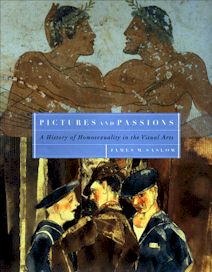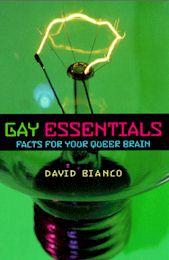 |


|
|
Pictures and Passions: A History of Homosexuality in the Visual Arts by James M. Saslow; Viking; 342 pages; $39.95.
 This wonderful book is the first comprehensive survey of male and female
homosexuality in art.
This wonderful book is the first comprehensive survey of male and female
homosexuality in art.
For many of us, "gay art" means gay erotic art, primarily male nudes, and here the literature has not been lacking. However, to Dr. Saslow, author of Ganymede and the Renaissance, there is more to gay art than sex: "This book chronicles the manifold ways that homosexuality has contributed to visual culture, from bisexual Greek men who paid neighborhood potters to turn out gifts for their beloved boys to the homophobic propaganda of Adolf Hitler." Gay art works "range from American Indian basket weaving to clothing, mass media, popular arts and advertising, and even buildings and cities - for, as the old saw pithily puts it, We shape our buildings, and our buildings shape us.'" All this explains Saslow's frequent excursions into social and political history, though sometimes we wish he'd spend more time discussing his main topic, which is art. Still, even art historians realize that we cannot understand art without understanding the society that produced it. The jury is still out as to whether there is a vital link among same-sex lovin' people throughout history, and Saslow only adds to the controversy by widening the scope of his study to include "a continuum of emotions between people of the same sex, from homosocial friendship to homoerotic intimacy to genital passion, whether or not they culminate in sexual union." This loose definition allows Saslow to avoid the pitfalls of the essentialist-constructivist controversy, and write a survey as wide as all humanity. Following an all-too brief survey of "tribal societies", Saslow dives into the Classical World, perhaps the period in history most closely linked to homosexual art. He then moves on to the Middle Ages, the Renaissance - the other "golden age" of homoerotic art - and "Asia and Islam" before dealing with the last two centuries' explosion of gay and lesbian art.
When he was asked if there was a "gay aesthetic", the late film critic Vito Russo (The Celluloid Closet) replied, "No, and I've got one." Perhaps this is why it's so difficult for Saslow or anyone else to write a comprehensive survey of post-Stonewall LGBT art. As he put it, "Any attempt to chart this burgeoning territory faces several hurdles. One is sheer size ... Another is too little time ... And a third is diversity..." Even so, Saslow manages to cover a wide field in his all-too brief chapter on contemporary queer art, from Keith Haring's graffiti to Tee Corinne's negatives to the NAMES Project Quilt, which Saslow rightly calls "the largest gay art project in history." Though fashion and interior design (two "gay" art forms) are given short shrift, Saslow's survey includes gay architect Philip Johnson's design for the Cathedral of Hope in Dallas, Karin Daan's Homomonument in Amsterdam and George Segal's Gay Liberation statuary group in Greenwich Village. "Though the present always seems less coherent than the past, the current richness of gay and lesbian art is, like all of postmodern culture, undeniably tentative, fragmented, and contested", not unlike Pictures and Passions. Even so, James Saslow's survey is the most complete work of its kind, a good introduction to LesBiGay art and culture, and a near-perfect holiday gift for the educated, art-lovin' person on your list. Gay Essentials: Facts for Your Queer Brain by David Bianco; Alyson Books; 327 pages; $12.95.
 Gay Essentials is a collection of essays taken from David Bianco's
popular syndicated column, "Past Out".
Gay Essentials is a collection of essays taken from David Bianco's
popular syndicated column, "Past Out".
Appearing in 75 newspapers across the USA, "Past Out" serves as a primer in LesBiGay history, politics and culture, and manages the near-impossible by being both educational and entertaining. Even those of us who know our gay history well enjoy Bianco's column, for he is a genius at including new angles and little-known bits of trivia in his often-told tales. With Gay Essentials, readers who missed the earlier columns will be able to catch up while those who collected every installment will be able to throw out their old newspapers. "I have not attempted ... to write a comprehensive history of homosexuality," Bianco admits. Though Bianco tried his best to place his essays in some sort of chronological order, a series of articles that were written to stand on their own do not make for a connected narrative. Even worse from a scholarly point of view is the lack of footnotes or an index, though the list of suggested readings give us an idea of where Bianco got his information from (I've used some of the same sources). Gay Essentials will not be used by scholars, who will go to the original sources, but by educated lesbians and gay males who want to know more about our collective past. They will not be disappointed. |
 © 1997-99 BEI
© 1997-99 BEI